The Taipei District Prosecutors’ Office yesterday said it would not press charges against Chinese Nationalist Party (KMT) Legislator Chiang Wan-an (蔣萬安) after wrapping up its investigation into vote-buying allegations.
Independent candidate Billy Pan (潘建志), a psychiatrist and political commentator, who lost the Jan. 16 legislative election to Chiang in Taipei’s Songshan (松山) and Zhongzheng (中山) districts, had accused Chiang of offering prizes at public events to solicit votes.
The office said there was insufficient evidence that Chiang engaged in vote-buying.
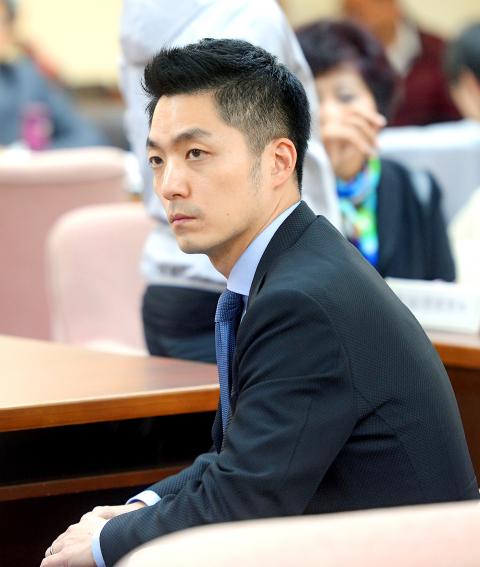
Photo: Lin Cheng-kung, Taipei Times
However, Chiang is not yet cleared from election-related litigation, since Pan had also filed a civil suit to nullify the election result, with the Taipei District Court scheduled to start its hearing next month.
Chiang Wan-an is the son of former KMT vice chairman John Chiang (蔣孝嚴) and grandson of former president Chiang Ching-kuo (蔣經國).
Pan accused Chiang Wan-an of providing prizes for raffles, including bicycles and electric fans, at three traditional holiday events in September and November last year, as the campaign for the legislative elections began to heat up.
Armed with photographs, video recordings and other materials provided by the public, Pan went to the Taipei District Prosecutors’ Office on Nov. 28 last year and asked prosecutors to investigate alleged “vote-buying activities” by Chiang Wan-an.
The videos and photographs showed Chiang Wan-an giving away prizes, which had labels bearing his name, during the three public events. He also addressed the crowd and called for support in January’s elections.
Pan said the events were organized by local boroughs in the legislative election district that the two were contesting, and only local borough residents were eligible for the raffle prize draw.
It therefore constituted “bribery” of eligible voters with gifts in exchange for their votes, Pan said.
In the video recording, Chiang Wan-an’s campaign office manager, Chuko Fen (諸葛芬), was shown handing out prizes to raffle draw winners and calling on residents to cast their votes for Chiang.
Chiang Wan-an, a lawyer, said he did participate at the three events and provided prizes for the raffle draws.
However, providing gifts “proportional to social etiquette” during traditional holiday celebrations does not constitute bribery under election regulations, he said, adding that he was only a “passive” participant at the time, having been invited by local borough wardens who organized the events.
Chiang also said Pan’s allegations of vote-buying were “insulting to voters’ intelligence,” and decried such “negative campaign tactics.”
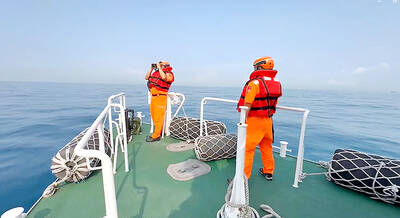
An increase in Taiwanese boats using China-made automatic identification systems (AIS) could confuse coast guards patrolling waters off Taiwan’s southwest coast and become a loophole in the national security system, sources familiar with the matter said yesterday. Taiwan ADIZ, a Facebook page created by enthusiasts who monitor Chinese military activities in airspace and waters off Taiwan’s southwest coast, on Saturday identified what seemed to be a Chinese cargo container ship near Penghu County. The Coast Guard Administration went to the location after receiving the tip and found that it was a Taiwanese yacht, which had a Chinese AIS installed. Similar instances had also
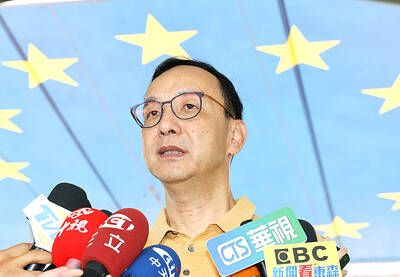
GOOD DIPLOMACY: The KMT has maintained close contact with representative offices in Taiwan and had extended an invitation to Russia as well, the KMT said The Chinese Nationalist Party (KMT) would “appropriately handle” the fallout from an invitation it had extended to Russia’s representative to Taipei to attend its international banquet last month, KMT Chairman Eric Chu (朱立倫) said yesterday. US and EU representatives in Taiwan boycotted the event, and only later agreed to attend after the KMT rescinded its invitation to the Russian representative. The KMT has maintained long-term close contact with all representative offices and embassies in Taiwan, and had extended the invitation as a practice of good diplomacy, Chu said. “Some EU countries have expressed their opinions of Russia, and the KMT respects that,” he
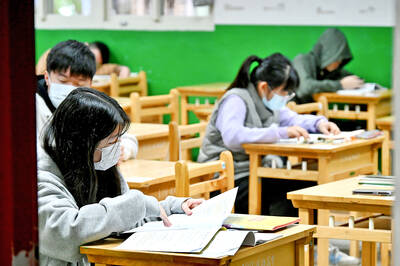
CHANGES: After-school tutoring periods, extracurricular activities during vacations or after-school study periods must not be used to teach new material, the ministry said The Ministry of Education yesterday announced new rules that would ban giving tests to most elementary and junior-high school students during morning study and afternoon rest periods. The amendments to regulations governing public education at elementary schools and junior high schools are to be implemented on Aug. 1. The revised rules stipulate that schools are forbidden to use after-school tutoring periods, extracurricular activities during summer or winter vacation or after-school study periods to teach new course material. In addition, schools would be prohibited from giving tests or exams to students in grades one to eight during morning study and afternoon break periods, the
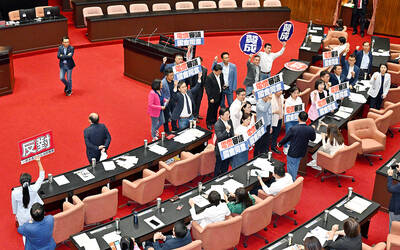
AMENDMENT: Contact with certain individuals in China, Hong Kong and Macau must be reported, and failure to comply could result in a prison sentence, the proposal stated The Chinese Nationalist Party (KMT) and the Taiwan People’s Party (TPP) yesterday voted against a proposed bill by Democratic Progressive Party (DPP) lawmakers that would require elected officials to seek approval before visiting China. DPP Legislator Puma Shen’s (沈伯洋) proposed amendments to the Act Governing Relations Between the People of the Taiwan Area and the Mainland Area (臺灣地區與大陸地區人民關係條例), stipulate that contact with certain individuals in China, Hong Kong and Macau should be reported, while failure to comply would be punishable by prison sentences of up to three years, alongside a fine of NT$10 million (US$309,041). Fifty-six voted with the TPP in opposition